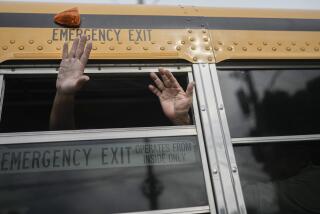Central American Diplomats Open Talks : Foreign Ministers Begin Working Out Details of Peace Plan
SAN SALVADOR — Central American foreign ministers opened a two-day meeting here Wednesday to begin hammering out details of a loosely worded peace plan that was signed by the region’s five presidents in Guatemala on Aug. 7.
Salvadoran Foreign Minister Ricardo Acevedo Peralta warned his colleagues that they face such extreme difficulty in implementing the accord that “it will continually test the true political will of our governments, their sincerity, honesty and capacity to respond to the desires of our citizens.”
In an indication of the fragile political situation in the region, Honduran Foreign Minister Carlos Lopez Contreras’ failure to show up for the morning session raised intense speculation as to his intentions.
Lopez reportedly met with U.S. Ambassador Everett E. Briggs in Honduras after the ambassador returned from a Monday meeting in Washington with the other U.S. envoys to Central America and Reagan Administration officials. He is expected to arrive here this morning.
A Costa Rican official at the meeting here said the foreign ministers of Guatemala, El Salvador and Costa Rica also met with top U.S. diplomats in their countries who communicated Washington’s “ideas and worries” about the Aug. 7 peace plan.
The Reagan Administration contends that Nicaragua is not likely to honor the Aug. 7 peace agreement, and Administration officials said Tuesday that they will seek “non-lethal” aid to keep the Nicaraguan contras intact as a pressure force for several months beyond a Nov. 7 cease-fire deadline mandated by the peace plan.
The U.S.-backed contras are fighting to oust the leftist, Sandinista government of Nicaragua, while in El Salvador, the leftist Farabundo Marti National Liberation Front guerrillas are fighting to oust the U.S.-backed government.
Some contra leaders arrived in El Salvador on Wednesday but said they will not comment until they meet Friday with Salvadoran President Jose Napoleon Duarte. Duarte has called for the contras and the Salvadoran guerrillas to endorse the peace plan and hold talks with the governments in their respective countries.
Contra officials have said privately they fear that the peace plan will lead to a cutoff in U.S. aid, but that they also are considering sending some of their members back to Nicaragua to take advantage of an amnesty and to negotiate.
The plan calls for “simultaneous and public” cease-fires, amnesty programs and democratization measures such as press freedom and political pluralism within 90 days of its signing. It also calls for an end to international aid to the rebels, and for the Central American countries to prohibit the use of their territory by foreign rebels.
The plan, signed by the presidents of Costa Rica, Nicaragua, Honduras, El Salvador and Guatemala, has no sanctions for non-compliance.
Officials attending the meeting said they hope to set up a more specific timetable for implementing the plan. Diplomatic observers were optimistic that momentum will carry the plan forward. But one Latin American diplomat noted, “No one trusts anyone here. . . . This is a war of nerves now and everyone is waiting for the other to make an error.”
Since the plan was signed, various factions in the Nicaraguan and Salvadoran conflicts have begun posturing in an apparent move to strengthen their positions at the negotiating table.
In Nicaragua last weekend, police armed with electric prods and German shepherd dogs broke up an opposition demonstration, arresting a prominent human rights activist and a lawyer for the Conservative Party.
Lino Hernandez, executive secretary of the Permanent Commission on Human Rights, and attorney Alberto Saborio were detained Saturday after a scuffle with police during the opening of the headquarters of the Nicaraguan Democratic Coordinate, an anti-Sandinista umbrella group.
Some analysts and Sandinista critics have suggested the incident may reflect divisions among the nine-member Sandinista directorate over the peace plan signed by President Daniel Ortega. Interior Minister Tomas Borge, considered to be more radical than Ortega, oversees the police.
Ortega, meanwhile, traveled to Cuba to seek support for the plan from President Fidel Castro.
On the eve of the foreign ministers’ meeting here, Nicaraguan Vice President Sergio Ramirez announced on television that the country has a severe petroleum shortage and will increase rationing. Analysts here interpreted the move as a message to hard-liners inside the country that Nicaragua cannot afford to hold out on negotiations, and to other governments that Nicaragua will need economic support.
In El Salvador, President Duarte announced that he is willing to hold talks with the guerrillas on the question of a cease-fire, but when the guerrillas agreed to discuss that and other points, Duarte said he would talk with them only if the rebels renounce violence.
The Salvadoran military, meanwhile, insists there should be no dialogue unless the guerrillas put down their arms. Military officials say they fear the plan will “consolidate a Marxist government in Nicaragua,” according to a high-ranking officer, and that the Sandinistas will not stop aid to Salvadoran rebels.
A high-ranking Salvadoran delegation, including the vice president, two government ministers and one of Duarte’s closest advisers, are in Washington this week to discuss the peace plan with U.S. officials.
A State Department official said he knew of no other Central American nation planning to send a similar delegation to Washington.
More to Read
Sign up for Essential California
The most important California stories and recommendations in your inbox every morning.
You may occasionally receive promotional content from the Los Angeles Times.










